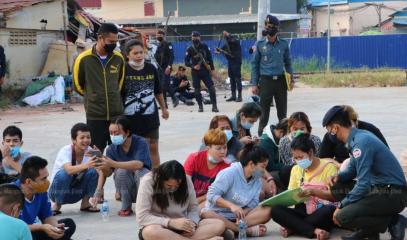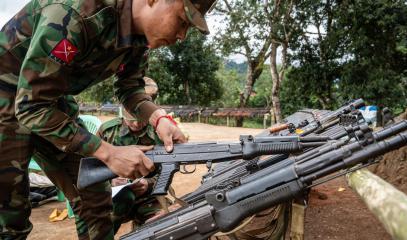Anwar's ASEAN: personal ambitions and unresolved issues
Southeast Asia expert Bridget Welsh analyses Kuala Lumpur's first steps at the helm of the bloc: the leadership will be successful if it puts ‘the interests of those who live in the region above those of its leaders’. ‘Calling for “inclusive elections” in Myanmar contradicts the real situation on the ground’.
Kuala Lumpur (AsiaNews) - Malaysia's much-vaunted rotating ASEAN presidency for 2025, led by Prime Minister Anwar Ibrahim, could fall far short of expectations, especially with regard to the priorities of the bloc of 10 Southeast Asian countries. This is the opinion of the analyst and expert on international affairs Bridget Welsh, who emphasises the real risk of attention being ‘too focused on Anwar’ and ‘too little’ interest in the many issues concerning the association.
To give an example, the expert mentioned Prime Minister Anwar Ibrahim's personal choice to have the controversial former Thai Prime Minister Thaksin Shinawatra as ASEAN advisor; a decision that was certainly not appreciated by the Bangkok government and in a nation characterised by deep political divisions (also) around the Shinawatra family. She then added that ‘Thaksin's interventions on the crisis in Myanmar have so far had no impact’.
Another problem is the lack of a feasible plan or a well-defined roadmap to meet the bloc's expectations, especially when the focus will be more on the ‘pressure points’ that ASEAN has to face. In her blog ‘Bridget Welsh’ the expert also stated that it is equally evident that the Kuala Lumpur presidency for 2025 got off on the ‘wrong foot’ at the first meeting at Foreign Minister level in Langkawi (Malaysia) last month.
‘The joint statement released after the meeting,’ he explains, ’was a long and unfocussed list of tired reaffirmations on a range of issues, from ASEAN's role in regional security and economic cooperation to Israel's actions in Gaza.’
‘The communiqué,’ Welsh continues, “spoke of broad ambitions, but did not adequately highlight the priority areas for action” of the bloc of 10 Southeast Asian countries. And Kuala Lumpur itself seemed “unprepared” to engage the media on its presidency plans. If Malaysia does not create ‘a roadmap for its objectives for ASEAN in 2025, it risks wasting a vital opportunity to strengthen the bloc’ in a ‘critical period of uncertainty in global geopolitics, leaving it open to attacks and accusations’.
ASEAN, the objectives
Welsh said that adjustments are needed and outlined some of the priorities on which the Malaysian presidency should act to achieve ASEAN objectives. ‘First of all, the regional bloc must be ready to respond to the threats looming over the Southeast Asian economy,’ he emphasised.
In this regard, ‘the spectre of tariffs imposed by Donald Trump's new administration in the United States has already unsettled many nations’ in the area. ‘Moreover, many of these countries have high trade deficits with the United States, which may have put them on Trump's list of countries under observation’.
On the other hand, ASEAN must maintain its ‘regional centrality now more than ever’, because the current geopolitical conditions risk favouring ‘individualistic behaviour’ on the part of countries and governments, rather than cooperation. These conditions will require Malaysia, the 2025 chair, to focus on promoting multilateral trade and collectively ameliorating potential economic disruptions.
Another urgent issue that requires Anwar's attention is ‘transnational crime’, also because ASEAN nations are often ‘the epicentre of a global multi-billion-dollar scam economy. Southeast Asia still seems to be in denial about the seriousness of this problem and why it needs to be addressed urgently,’ says the scholar.
In particular, according to Welsh, the member states Myanmar, Cambodia and Laos have become ‘fraud havens’, while criminal groups have ‘victimised people with online swindles about pig slaughtering and trafficked thousands of people with false job offers’.
These fraudulent operations have had a ‘ripple effect’, as they have started to negatively influence regional tourism, especially that from China. ‘Social media,’ he warns, ‘is full of Chinese citizens writing about their fear of being kidnapped, especially if they visit Cambodia or Thailand.
If ASEAN does not react now against transnational criminals, it will be much more difficult to do so later. One only has to look at the power of the cartels in the Americas to see the consequences of inaction at the regional level.
The Myanmar factor
Analysing the Langkawi meeting, the expert emphasises that Kuala Lumpur's response to the civil war in Myanmar was perhaps the most worrying indicator of a potentially ‘underwhelming’ presidency.
The local leadership has shown an inadequate understanding of the current conditions in Myanmar, where the fourth anniversary of the military coup that overthrew an elected government is taking place.
To make matters worse, Myanmar has been hit hard by the Trump administration's blockade of humanitarian assistance, which will aggravate an already critical situation. Referring to the ASEAN joint statement at the conclusion of the Langkawi Foreign Ministers' Meeting, she recalls how it called for “peace” and “inclusive elections” in Myanmar, contradicting the reality on the ground.
‘Recent ASEAN presidencies,’ according to the author, ’have strengthened engagement with the military junta, even as it has lost territory and power. Malaysia hinted that it might do the same when it reaffirmed that the main reference for political and diplomatic engagement will be the [already failed] five-point consensus.
’ ‘This move,’ he continues, ’indicates an inability to recognise the multiple stakeholders within Myanmar. The governments of the ASEAN member states have mistakenly prioritised the Burmese military over other groups, particularly the government of national unity and the ethnic armed groups that together control more than half of the country.’
Welsh then emphasised that the Malaysian presidency must adopt a more inclusive strategy for Myanmar, while publicly recognising and involving all interested parties. ‘If this is not done, lives are at risk, as well as Malaysia's reputation’, he warns.
Finally, if there was a promise made at the Langkawi meeting, it relates to the theme of Malaysia's ‘sustainability’ by 2025. The coming year offers potential for cooperation on carbon credits and the operation of the much-needed ‘ASEAN Centre for Climate Change’.
‘Here too, urgency is paramount, as the nations of Southeast Asia continue to be highly vulnerable to climate change-related damage. Malaysia's leadership within ASEAN will be successful if it puts the interests of the region's citizens above those of its leaders and sets clear priorities on pressing issues with achievable plans to achieve them,’ he concludes.





.jpeg)



.png)










